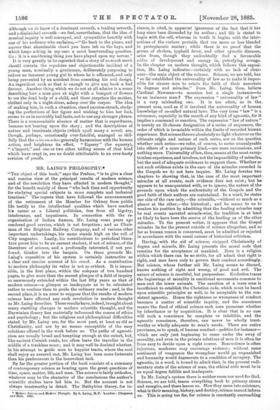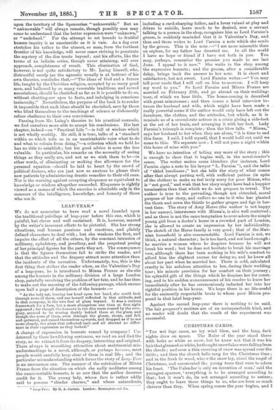MR. LAING'S PHILOSOPHY.* "THE object of this book," says the
Preface, "is to give a clear and concise view of the principal results of modern science, and of the revolution they have effected in modern thought," for the benefit mainly of those "who lack time and opportunity for studying special subjects in more complete and technical treatises." The regrets that have followed the announcement of the retirement of the Member for Orkney from public life testify to the intellectual qualities which have marked his career as a Liberal politician, free from all bigotry, intolerance, and impatience. In connection with the re- organisation of Indian finance, Mr. Laing some years ago rendered good service, which is not forgotten ; and as Chair- man of the Brighton Railway Company, and of various other important undertakings, his name stands high on the roll of City magnates. Lastly, his contributions to periodical litera- ture prove him to be an earnest student, if not of science, of the literature of science, and a profoundly interested, if not pro- found, thinker into the bargain. On these grounds Mr. Laing's exposition of his system is certainly instructive as a clear and concise account of his creed. As a contribution to modern philosophy its value is not so evident. It is impos- sible, in the first place, within the compass of two hundred pages, to give more than the merest glimpse of a field of inquiry so enormously extended within the last fifty years as that of modern science—a glimpse so inadequate as to be calculated rather to confuse than to guide the ordinary reader ; and, in the second place, it is an error to suppose that the results of modern science have effected any such revolution in modern thought as Mr. Laing describes. Those results have, indeed, brought about many startling changes in modern scientific thought, and the Darwinian theory has materially influenced the course of ethics and psychology ; but the religious and philosophical difficulties stated by Mr. Laing are, for the most part, at least as old as Christianity, and are by no means susceptible of the easy solutions offered in the work before us. The paths of agnosti- cism are usually broad and tempting enough at the outset, but, like ancient Cornish roads, too often leave the traveller in the middle of a trackless moor; and it may well be doubted whether, in his attempt to guide men to happier tracts, where the soul shall enjoy an assured rest, Mr. Laing has been more fortunate than his predecessors in the benevolent task.
By far the greater portion of the book consists of a summary of contemporary science as bearing upon the great questions of time, space, matter, life, and man. The science is fairly orthodox, whatever may be the character of the conclusions the author's scientific studies have led him to. But the account is not always trustworthy in detail. The Bathybius theory, for in-
• Modern Science and Modern Thought. By S. Laing, M.P., London: Chapman and Hall. MM. stance, is cited, in apparent ignorance of the fact that it has long since been discarded by its author ; and life is stated to begin with the cell, whereas in' truth it begins with the inter- actions of the various proteids that are more or less blended in protoplasmic matter ; while there is no proof that the germs of cholera, typhoid fever, and other zymotic diseases, arise from, though they undoubtedly find a favourable nidus of development and energy in, putrefying sewage. In the chapter on modern thought, which follows this exposi- tion, Mr. Laing indicates—certainly with no lack of clear- ness—the main object of the volume. Science, we are told, has " so far established the universality of law as to make it impos- sible for sincere men to retain the faith of their ancestors in dogmas and miracles." Does Mr. Laing, then, believe Cardinal Newman—to mention but a single instance—to be an insincere man P The expression " universality of law " is a very misleading one. It is too often, as in the. present case, used as if it involved the universality of human knowledge of so-called natural laws. The very term " law " is a misnomer, especially in the month of any kind of agnostic, for it implies a command or sanction. The expression " law of nature " is merely an ill-chosen designation of a series of sequences, the order of which is invariable within the limits of recorded human experience. But science throws absolutely no light whatever on the ultimate origin and nature of such series, nor on the question whether such series—we refer, of course, to series unanalysable into others of a more primary kind,—are mere successions, and nothing more. Universality of law, then, means at the most excep- tionless experience, and involves, not the impossibility of miracles, but the need of adequate evidences to support them. Whether or not such evidence exists in the case of the miracles recorded in the Gospels we do not here inquire. Mr. Laing devotes two chapters to showing that, in the case of the most important miracles at all events, such evidence does not exist ; but he appears to be unacquainted with, or to ignore, the nature of the grounds upon which the authenticity of the Gospels and the good faith of their authors are maintained. In a word, he states one side of the case only,—the scientific,—without so much as a glance at the other,—tbe historical ; and he seems to us to weaken his position by admitting that the healing miracles may be real events narrated miracle-wise; for tradition is at least as likely to have been the source of the healing as of the other miracles. To the present writer, it appears that the Gospel miracles lie for the present outside of science altogether, and so far as human reason is concerned, must be admitted or rejected in accordance with the usual canons of historical criticism.
Having, with the aid of science, stripped Christianity of dogma and miracle, Mr. Laing presents the moral code that remains for the acceptance of mankind. Here is a religion within which there can be no strife, for all admit that right is right, and men have only to govern their conduct accordingly. But science, whose further aid Mr. Laing seems to discard, knows nothing of right and wrong, of good and evil. The nature of science is resultful, but purposeless. Evolution traces the beginnings of morality in emotional movements common to man and the lower animals. The sanction of a mere man is insufficient to establish the Christian code, which must be based upon scientific principles as well, to be acceptable to the con- sistent agnostic. Hence the rightness or wrongness of conduct becomes a matter of scientific inquiry, and the conscience means the fund of ethical science each man possesses whether by inheritance or by acquisition. It is clear that in no case will such a conscience be complete or infallible, and the agnostic conscience, therefore, can never be wholly trust- worthy or wholly adequate to man's needs. There are entire provinces, so to speak, of human conduct—politics for instance— which are only just beginning to come under the sway of morality, and even in the private relations of men it is often far from easy to decide upon a right course. Benevolence is often injurious, meekness may encourage violence; without some sentiment of vengeance the wrongdoer would go unpunished and humanity would degenerate to a condition of savagery. The agnostic, in a word, is bound to admit that, in the present rudi- mentary state of the science of man, the ethical code must be in an equal degree fallible and inadequate.
In Mr. Laing's system there is neither room nor need for God. Science, we are told, traces everything back to primary atoms and energies, and there leaves us. How they came into existence, what is their meaning, history, and destiny, science cannot inform us. This is going too far, for science is constantly encroaching upon the territory of the Spencerian " unknowable." But an " unknowable " will always remain, though possibly men may come to understand that the better expression were "unknown," or " undefined." For the attempt to set bounds to fruitful human inquiry is as unscientific as it is vain. As a dog ever stretches his tether to the utmost, so man, from the furthest frontier of his knowledge, will never cease striving to penetrate the mystery of the dim tracts beyond ; and his efforts, like the terms of an infinite series, though never attaining, will ever approach, completeness of result. This elimination of God, however, is not quite satisfactory to Mr. Laing himself, who, distrustful surely (as the agnostic usually is at bottom) of his own theories, concludes that,—" The ideas of God and a future life, taught by the Christian religion, accepted by so many good men, and hallowed by so many venerable traditions and sacred associations, should be cherished as far as it is possible to do so, without shutting our eyes to facts, and indulging in conscious insincerity." Nevertheless, the purpose of the book is to render it impossible that such ideas should be cherished, save by those who blind themselves to the teachings of science or dishonestly refuse obedience to their own convictions.
Passing from Mr. Laing's theories to his practical counsels, we find ourselves more able to accept his conclusions. His last chapter, indeed—on "Practical Life "—is full of wisdom which is not wholly worldly. He still, it is true, talks of a " standard within us which tells us in an unmistakable voice what to do and what to refrain from doing,"—a criterion which we hold he has no title to establish ; but his good advice is none the less valuable. In particular, his remarks on the necessity of seeing things as they really are, and not as we wish them to be—in other words, of eliminating or making due allowance for the personal equation—should be laid to heart by the crowd of political doctors, who are just now so anxious to please their new patients by administering drastic remedies to their old ones. Nor is the warning against accepting eloquence as equivalent to knowledge or wisdom altogether unneeded. Eloquence is rightly viewed as a means of which the exercise is admirable only in the measure of the intelligence, knowledge, and honesty of those who use it.



































 Previous page
Previous page